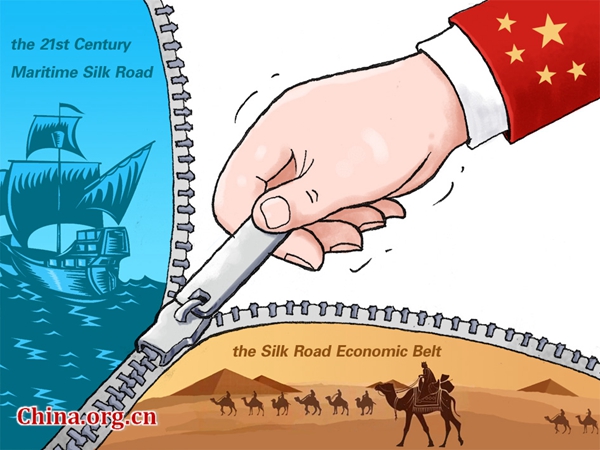India unwise staying out of the B&R
- By Sabena Siddiqui
 0 Comment(s)
0 Comment(s) Print
Print E-mail China.org.cn, April 15, 2017
E-mail China.org.cn, April 15, 2017

The Belt and Road International Forum will be held on May 14 in Beijing, when at least 20 heads of state are expected to attend to move the project forward.
By now, 100 countries and international organizations have joined the Belt and Road (B&R) Initiative with around 40 formalizing agreements with China. The mega-project today reflects a much broader international consensus than when it was launched three years ago.
The B&R synergy has already begun to reap a good harvest, having encouraged foreign investment, facilitated job creation and poverty alleviation, and economic corridor development.
The U.N. General Assembly and the Security Council have welcomed and endorsed the project in various resolutions and documents. And yet, a major regional player like India continues to maintain its distance and has become the odd man out.
Foreign Secretary S. Jaishankar was heard to say that he regarded connectivity as having “emerged as a theatre of present day geopolitics” while attending the inaugural Raisina Dialogue. Curiously though, the Indian lobby reportedly is constantly demanding operational blueprints of the project.
Unfortunately, India views the ongoing trade venture only from the geopolitical perspective, and the multiple advantages of enhanced trade connectivity have still not penetrated the fog of old rivalries. It clings to the stance that the China-Pakistan Economic Corridor (CPEC), flagship project of the Belt & Road Initiative, passes through disputed territory.
While such claims may be politically useful, they cannot stop the project or improve Indian prospects for getting any of the disputed territory. Pakistan has ceased to be dependent on India for trade thanks to the new route starting at Kashgar in Xinjiang and culminating at Gwadar on the Indian Ocean that is creating a new economic and strategic zone.
On the other hand, India is bound and restricted by its government’s short-sighted stance that provides no justification to explore the opportunities offered by the B&R project.
To a neutral observer, it does not make any sense for India to isolate itself from regional enhanced connectivity and miss out on this great opportunity. It is a typical case of “sour grapes” as India prefers to stay out because it feels Pakistan has an unfair advantage due to its geo-strategic location.
Staying out of the B&R means India is going against its own geography. As Sushil Aaron wrote in The Hindustan Times, “India’s detachment will seem particularly odd in the years to come as the infrastructure emerges on the horizon – as [the B&R] aims to build land and sea links between China and Europe through roads, railway lines, power projects and ports potentially in over 60 countries.”
Indian analysts like Rajni Bakshi have argued that Beijing has to co-design the new Silk Road with Indian involvement for it to have any chance of success. In other words, if China wants India’s acquiescence, the latter has to be involved in designing and implementing the project.
Needless to say, such unrealistic theories are damaging India’s own interests in the long run.
Further down the road, India will find its obstinate stand difficult to handle as friendly countries like Russia, Iran and even Afghanistan avail themselves of the opportunities offered by the CPEC. New Delhi may feel it is getting in the good books of Western countries by opposing CPEC and treating the B&R as something going down the wrong trail. However, this could be a miscalculation.
All the new U.S. policies regarding H1-B visas, outsourcing, American-based manufacturing and security alliances exclude Indian interests; with the availability of F-16s to India being held up, Indian firms dependent on outsourcing are being badly hit and visas are not available for Indian professionals.
Things are not how India might have visualized the future. It is shunning a mega economic project in its neighbourhood to look West instead of considering the needs of poverty alleviation and providing job opportunities.
It is apparent that most Western countries are interested in participating in the B&R which is less a purely Chinese initiative and more of an Asian/global joint project today.
Meanwhile, both India and Pakistan will become “full members” at the SCO summit in Tashkent this June. This will extend the organisation’s zone of influence to South Asia. The immediate focus will be on enhancing anti-terrorism and security cooperation as well as trade and economy. Regional connectivity might result in improved relations and anti-war /trade pacts in the future.
At the end of the day, India has to sit across the table with regional powers instead of constantly looking Westward. After all, it’s not possible for a state to change its neighbors.






Go to Forum >>0 Comment(s)